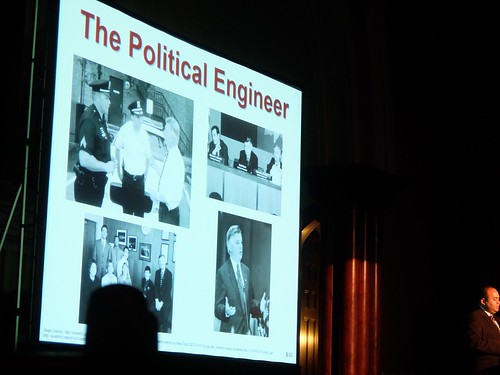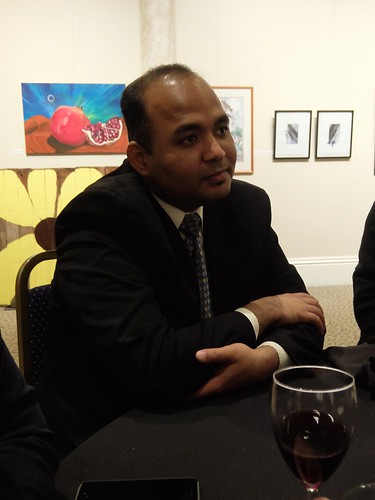I was doing more job training on that Thursday morning, not at Multnomah County Library, but for the same code school. Today is Friday, and Inauguration Day on the US federal calendar.
Then I treated myself to Voodoo Donuts, which I rarely do. I'd been Facebooking about a Voodoo Donuts in Tehran (I don't think there is one yet) and in Japan, and decided to take advantage of already having access.
That evening, I was self-indulgent again, enjoying a shrimp cocktail during happy hour, along with two pints at the Melting Pot at the downtown terminus of the 14 bus line. Then on to the lecture, on the South Park Blocks, across from the Portland Art Museum.
Dr. Guru Madhaven tells a tragic story I'll not repeat here. I recommend getting his book. I can't think of a more appropriate topic and speaker for anything calling itself the Institute for Science, Engineering and Public Policy, as his focus was precisely the impact, of engineering especially, on public policy.
The tragedy of not being able to help someone in an emergency, because not knowing their precise location, even though we had the technology to triangulate, required a solution that would connect GPS with 911. That we have a system that now links them is owing to a collaboration and synergy between political movements, and technology.
Later during the dinner I asked our speaker directly if he thought replacing the term "politician" with "social engineer" might be worth doing. I'd been saying something similar on a Quaker discussion site. Let me find a quote:
In my youth, the notion of "social engineering" was always somewhat sneered at as something fascist totalitarians might indulge in. I'm sure that they might; they'd have to. But then so does everybody else. Television and radio, then telephony, also transformed politics. We can't tease out the engineering from the rest of it.
Dr. Madhaven said as much in describing how we all do systems analysis whether we call it that or not. We all have to think and act like engineers on a daily basis, with or without any formal schooling in some discipline called "engineering". The same is true with politics. Whether you're a professional politician or not, you're still a political animal. And that means you're a social engineer.
That's the thing about truisms. Even though they're not provably false and therefore appear to do no work in the realm of establishing new facts of the matter, they may change how we look at things. Spin may be orthogonal to truth value.
Also around the table, I brought up my Kerala story, how anthropology had discovered the relatively high living standards of this state within India has everything to do with a culture of endless debate and discussion as a means of negotiation.
Optimization comes not from brute force or "throwing money" at a problem. Better to think things through, by having whole populations engaged in that thinking. Doesn't that sound close to what we mean by "democratic" on many levels? Feedback loops. Cybernetics. USA OS.
Then I treated myself to Voodoo Donuts, which I rarely do. I'd been Facebooking about a Voodoo Donuts in Tehran (I don't think there is one yet) and in Japan, and decided to take advantage of already having access.
That evening, I was self-indulgent again, enjoying a shrimp cocktail during happy hour, along with two pints at the Melting Pot at the downtown terminus of the 14 bus line. Then on to the lecture, on the South Park Blocks, across from the Portland Art Museum.
Dr. Guru Madhaven tells a tragic story I'll not repeat here. I recommend getting his book. I can't think of a more appropriate topic and speaker for anything calling itself the Institute for Science, Engineering and Public Policy, as his focus was precisely the impact, of engineering especially, on public policy.
The tragedy of not being able to help someone in an emergency, because not knowing their precise location, even though we had the technology to triangulate, required a solution that would connect GPS with 911. That we have a system that now links them is owing to a collaboration and synergy between political movements, and technology.
Later during the dinner I asked our speaker directly if he thought replacing the term "politician" with "social engineer" might be worth doing. I'd been saying something similar on a Quaker discussion site. Let me find a quote:
I get this push back, as a geek, that what I do might be nefarious, and it's called "social engineering" (say I work for Facebook, which I don't, just have a profile and play a Hexagons-based game).What I've come to is we have plenty good enough reasons to use "social engineer" as a synonym for "politician". Think how software engines such as Facebook and Twitter have changed the political landscape. The new US President (as of today) is a tweeter, as was the outgoing one.
I'm fine with what politicians do being "social engineering" the way they do it, with their technology, tips and tricks. I'll even say they're pretty good at it.
However, they don't wanna play, and keep excluding me as an "engineer" (some kind of Morlock by the sound of it -- H.G. Wells).
In my youth, the notion of "social engineering" was always somewhat sneered at as something fascist totalitarians might indulge in. I'm sure that they might; they'd have to. But then so does everybody else. Television and radio, then telephony, also transformed politics. We can't tease out the engineering from the rest of it.
Dr. Madhaven said as much in describing how we all do systems analysis whether we call it that or not. We all have to think and act like engineers on a daily basis, with or without any formal schooling in some discipline called "engineering". The same is true with politics. Whether you're a professional politician or not, you're still a political animal. And that means you're a social engineer.
That's the thing about truisms. Even though they're not provably false and therefore appear to do no work in the realm of establishing new facts of the matter, they may change how we look at things. Spin may be orthogonal to truth value.
Also around the table, I brought up my Kerala story, how anthropology had discovered the relatively high living standards of this state within India has everything to do with a culture of endless debate and discussion as a means of negotiation.
Optimization comes not from brute force or "throwing money" at a problem. Better to think things through, by having whole populations engaged in that thinking. Doesn't that sound close to what we mean by "democratic" on many levels? Feedback loops. Cybernetics. USA OS.


